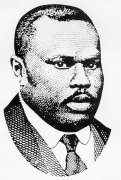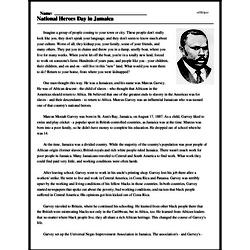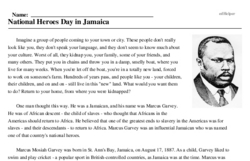National Heroes Day in Jamaica
National Heroes Day in Jamaica
Reading Comprehension for October 17
Imagine a group of people coming to your town or city. These people don't really look like you, they don't speak your language, and they don't seem to know much about your culture. Worst of all, they kidnap you, your family, some of your friends, and many others. They put you in chains and throw you in a damp, smelly boat, where you live for many weeks. When you're let off the boat, you're in a totally new land, forced to work on someone's farm. Hundreds of years pass, and people like you - your children, their children, and on and on - still live in this "new" land. What would you want them to do? Return to your home, from where you were kidnapped?
One man thought this way. He was a Jamaican, and his name was Marcus Garvey. He was of African descent - the child of slaves - who thought that Africans in the Americas should return to Africa. He believed that one of the greatest ends to slavery in the Americas was for slaves - and their descendants - to return to Africa. Marcus Garvey was an influential Jamaican who was named one of that country's national heroes.
Marcus Mosiah Garvey was born in St. Ann's Bay, Jamaica, on August 17, 1887. As a child, Garvey liked to swim and play cricket - a popular sport in British-controlled countries, as Jamaica was at the time. Marcus was born into a poor family, so he didn't have money to complete his education. He dropped out of school when he was 14.
At the time, Jamaica was a divided country. While the majority of the country's population was poor people of African origin (former slaves), British royals and rich white people ruled Jamaica. There wasn't much work for poor people in Jamaica. Many Jamaicans traveled to Central and South America to find work. What work they could find paid very little, and working conditions were often harsh.




